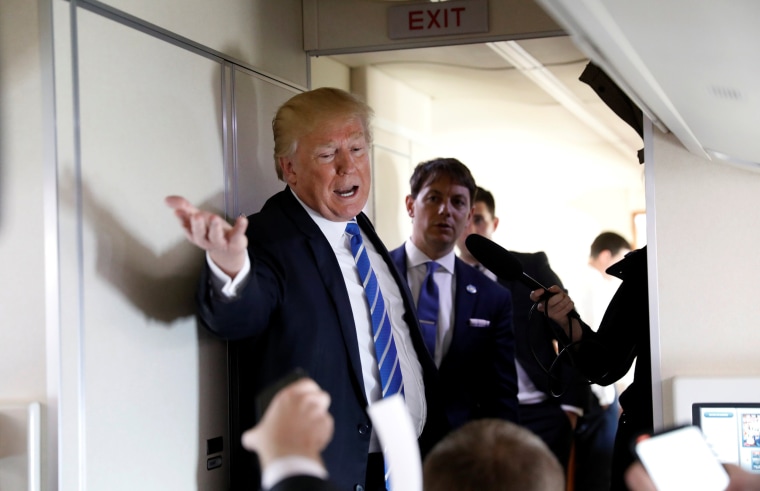Legal analysis
“No.”
That was President Trump’s response on Thursday when asked if he was aware of the payment made by his personal attorney to allegedly silence an adult film star who claims she had an affair with the president.
With that word, uttered on Air Force One to reporters, the president for the first time commented on the $130,000 payment made by Michael Cohen to Stormy Daniels.
It’s often the case that just a few unplanned words by a litigant can alter the course of litigation.
It’s also often the case that one side sees an opponent’s statement as a huge misstep, but the other side sees the same statement as perfectly consistent with their position.
Trump wasn’t finished answering questions about the reports with just that one word, though.
The same reporter followed up, asking why Cohen made the payment “if there was no truth to her allegations?”
“You’ll have to ask Michael Cohen,” Trump said. “Michael’s my attorney, and you’ll have to ask Michael.”
Another reporter asked the president: “Do you know where he got the money to make that payment?”
Trump answered: “No, I don’t know.”
That reporter followed up: “Did you ever set up a fund of money that he could pull from?”
Trump ignored that question and pointed out another reporter for a question on a different topic.
Shortly after that, Daniels’ attorney, Michael Avenatti, was jubilant during an interview with MSNBC’s Ari Melber. He went on to explain that it is a “very Merry Christmas here in our camp. This is what happens when you have an undisciplined client. We waited for Christmas and lo and behold, it’s arrived.”
Trump’s lack of knowledge of the payment fits into Daniels’ theory of the case: Trump never signed the agreement; Trump never performed under the agreement. Thus, there is no agreement.
Avenatti will likely argue that, with a few words, Trump has effectively sealed off any option to personally enforce the settlement agreement or the arbitration clause against Daniels. Only Essential Consultants, or “EC” can even try to enforce it. EC is the only party other than Daniels who signed the agreement, and now Trump’s response affirms that EC and Daniels were the only parties who knew of the agreement’s existence.
So why would Trump make these statements that Avenatti said indicates he is “undisciplined” and has “finally cracked”?
Because Trump’s statements also fit with the Trump/EC/Cohen theory of the case, too.
That’s the beauty of contract law: The parties can take the same signed (or unsigned) agreement entered into by the parties, apply completely different principles of contract law, and arrive at completely different interpretations of the same writing. What one side calls an “undisciplined” meltdown, the other side calls a statement supporting their argument.
Trump not knowing anything about the payments fits with the defense theory of the case: Trump didn’t sign the settlement agreement because he didn’t have to in order for it to be enforceable.
To Cohen and Trump, arguably, the “and/or” provisions of the contract mean that either Trump or EC could enforce it against Daniels. Because “and/or” gives EC power equal to Trump, Trump didn’t even need to sign the agreement.
In fact, Cohen’s attorney David Schwartz recently took it a step further, and argued to CNN’s Anderson Cooper that Trump is not a “party” at all, but rather a “third party beneficiary.”
A contract, made expressly for the benefit of a non-party, may be enforced by that non-party, even if he did not sign the agreement. In that case the non-party is a “third-party beneficiary.”
So in this situation, a “donee beneficiary” is a third-party beneficiary (Trump) to whom a party to the original agreement (Cohen) intends to make a gift of the other party’s (Daniels’) performance (not speaking about the alleged tryst) under the original contract.
Third-party beneficiaries are a common feature of contract law. Indeed, most of us are either third-party beneficiaries under some contract, or we have contracted to enrich donee beneficiaries. Indeed, with just a few changes to the original agreement — like deleting the Trump signature line, which suggests he was a party, not a beneficiary — this “beneficiary” argument might have been airtight.
Is the current Daniels/EC/Trump agreement, as worded, crystal clear as to whether Trump is a party or a third-party beneficiary?
In a word: No.
Danny Cevallos is an MSNBC legal analyst. Follow @CevallosLaw on Twitter.

